Презентация power and politics
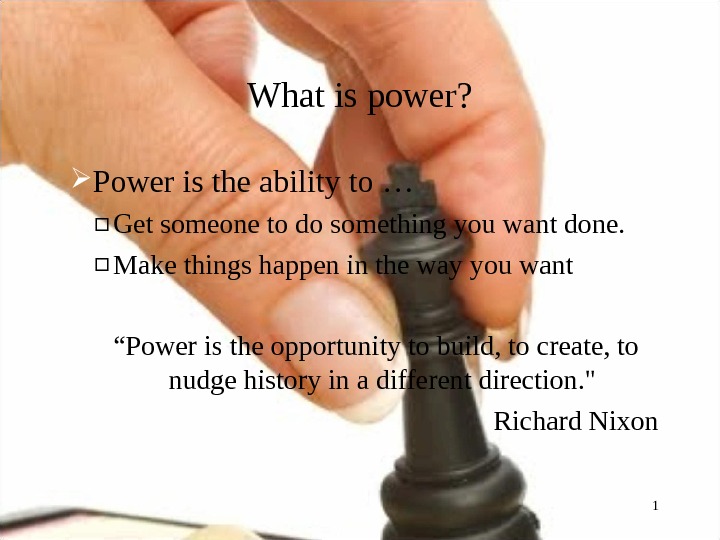
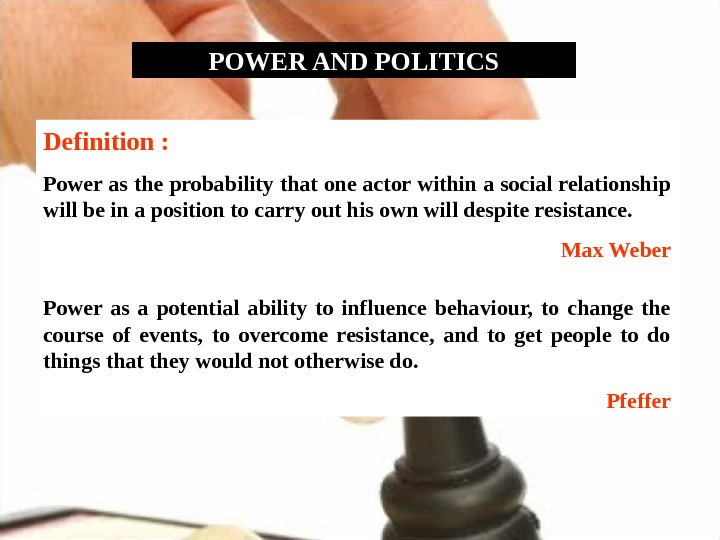
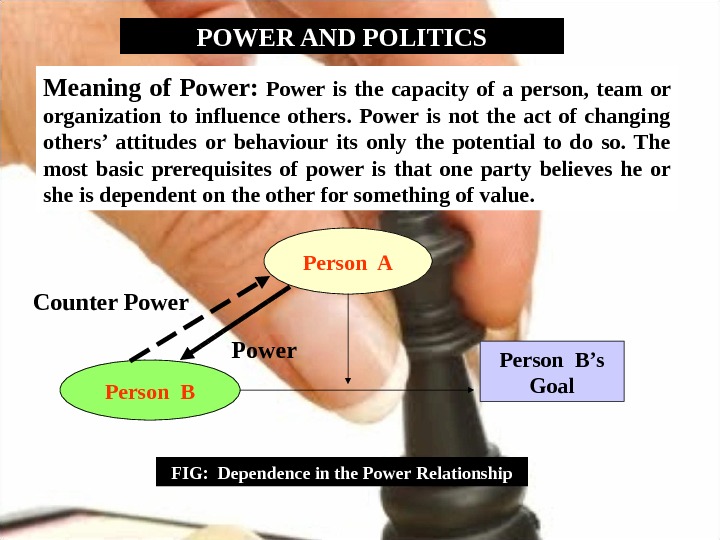

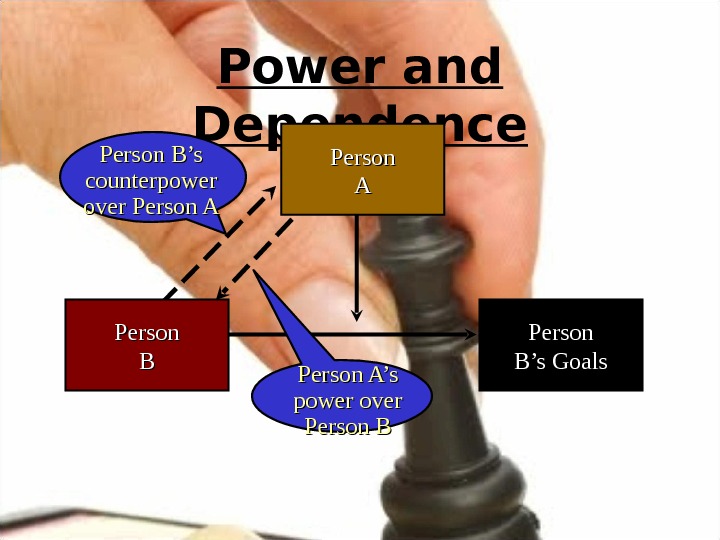
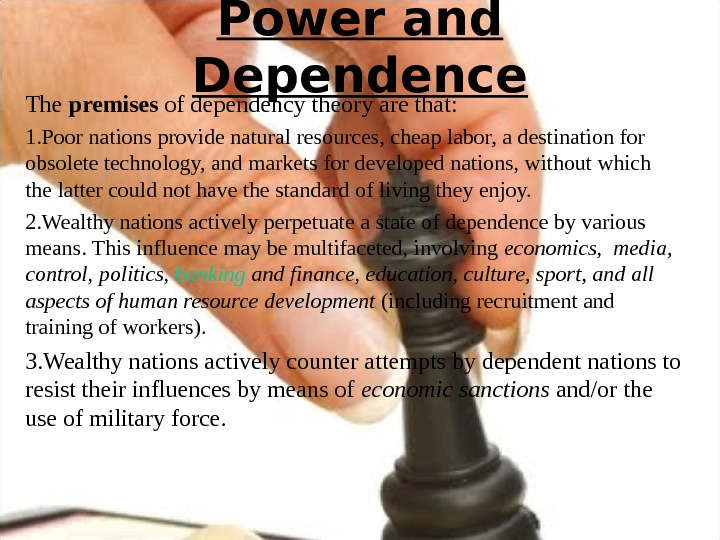
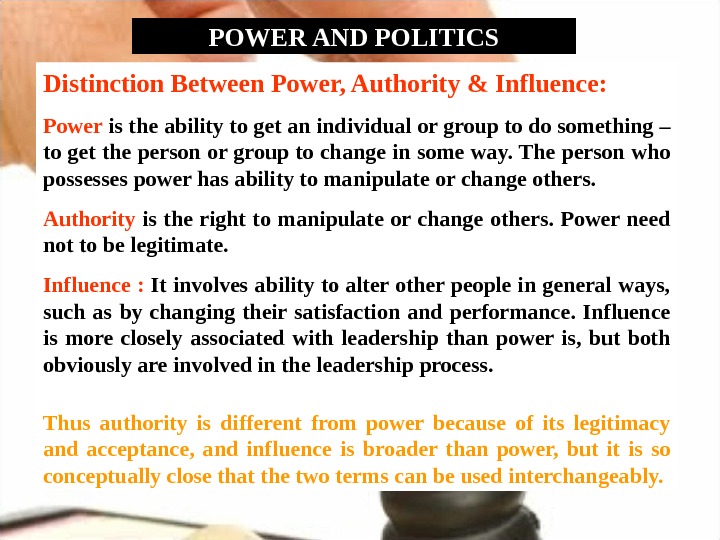
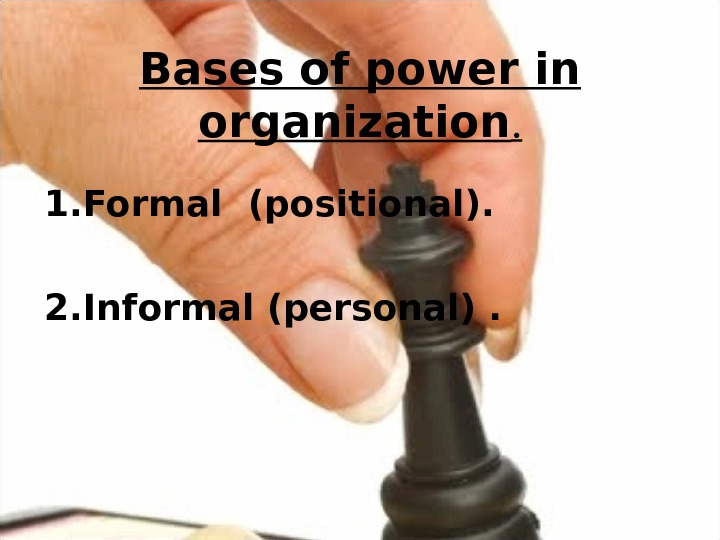
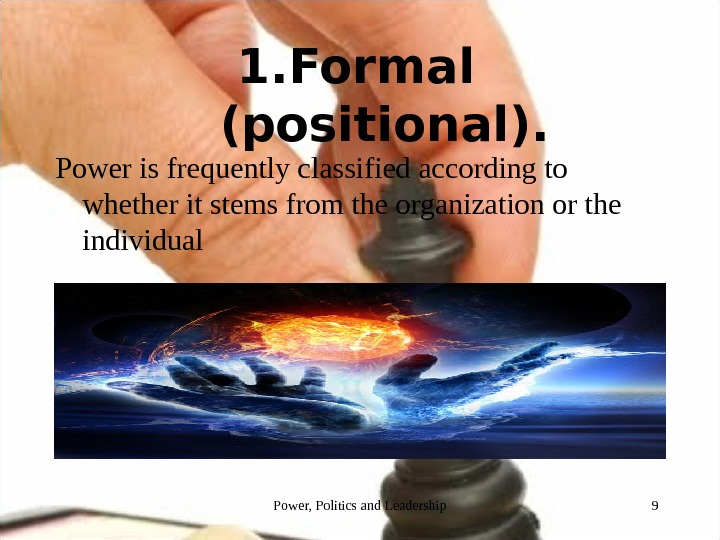
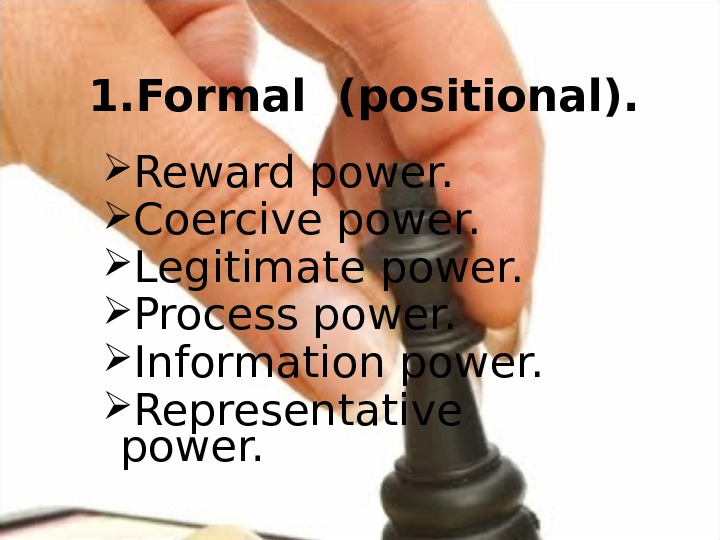
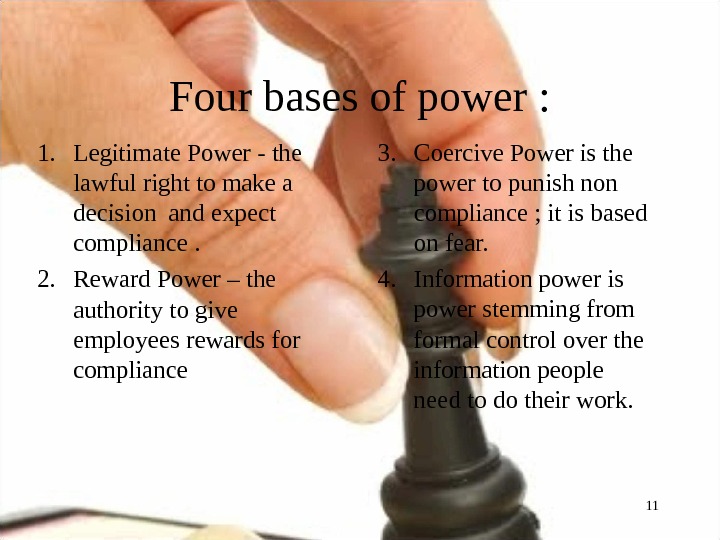
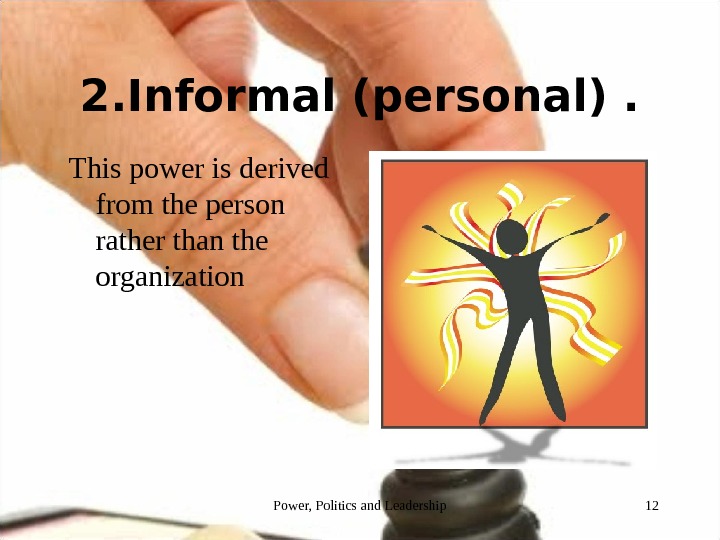
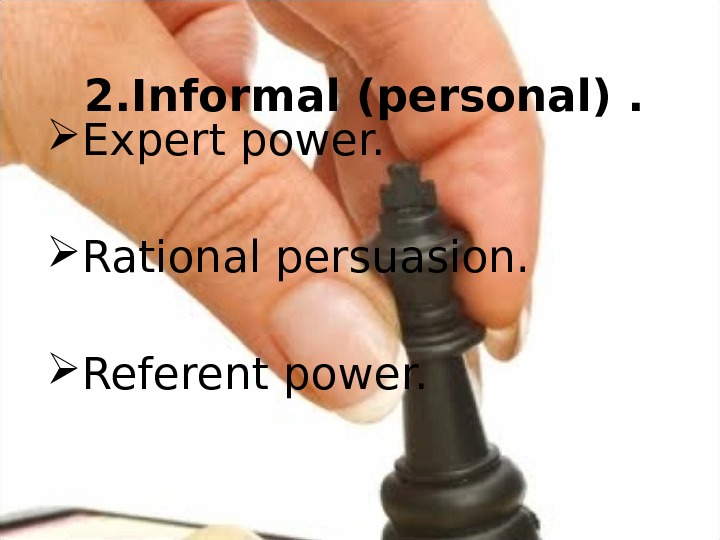
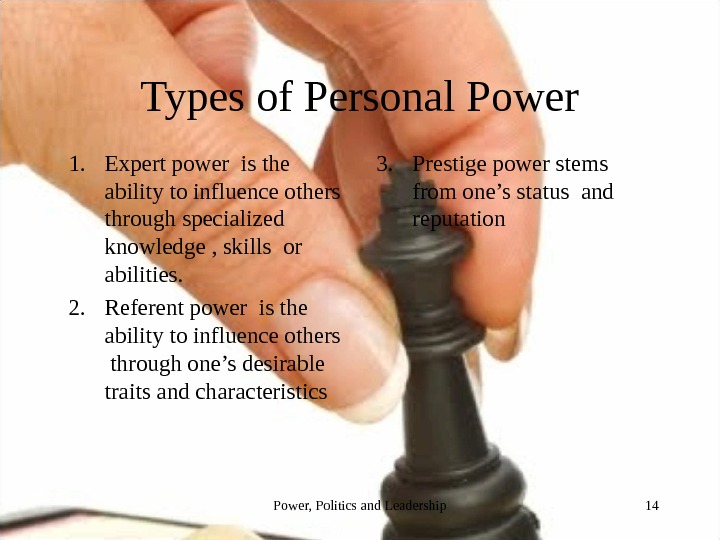
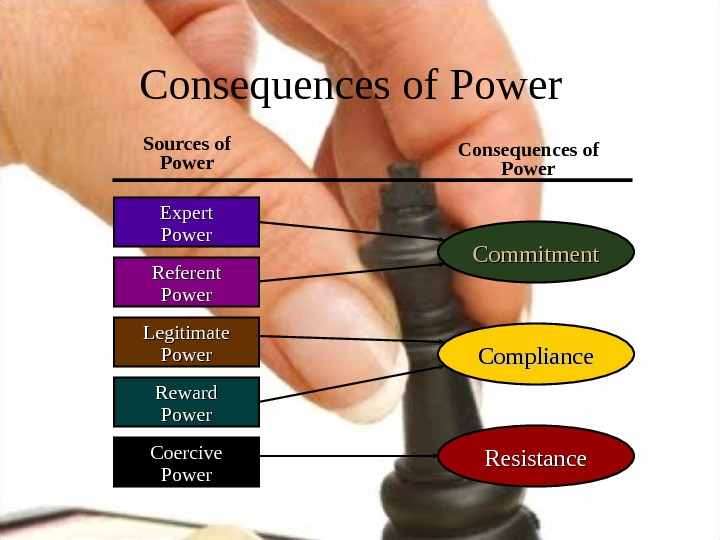


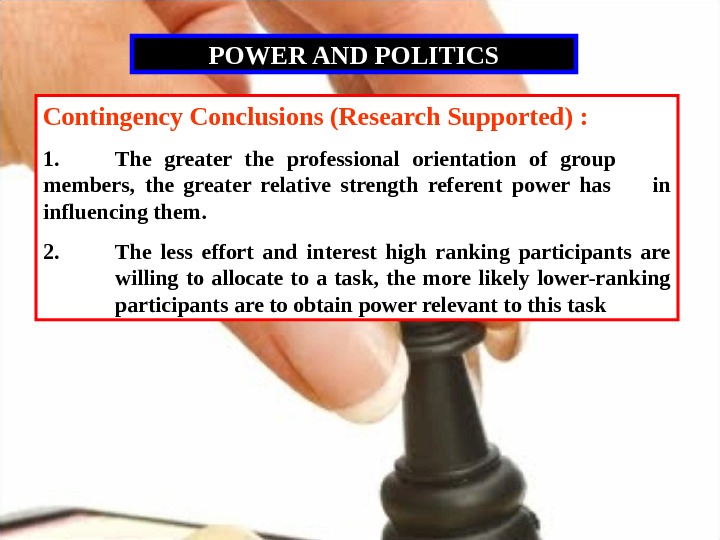

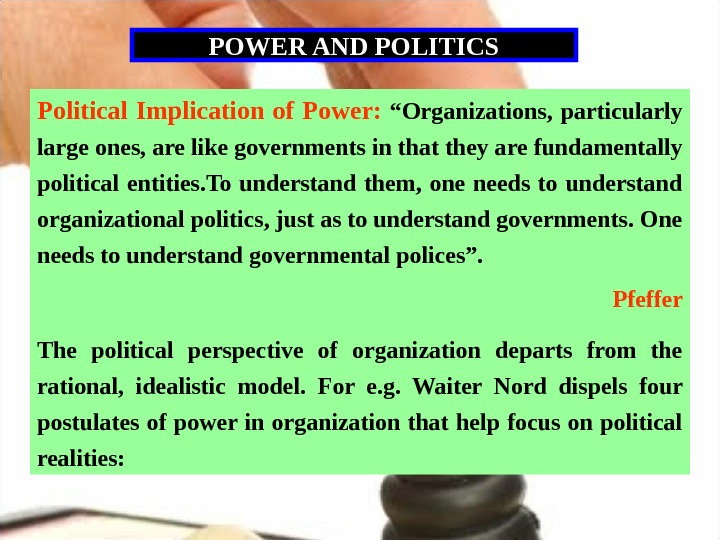
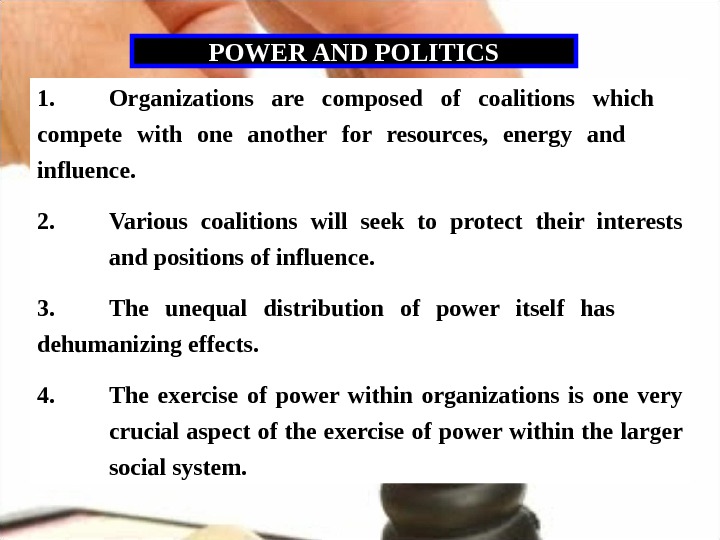
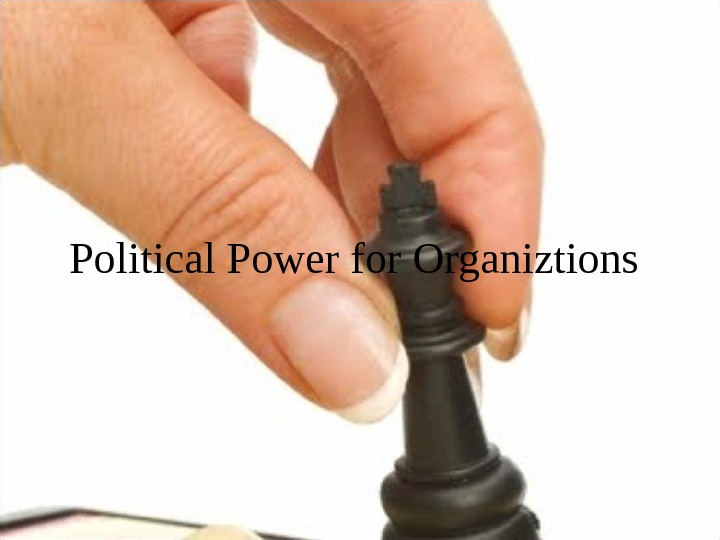
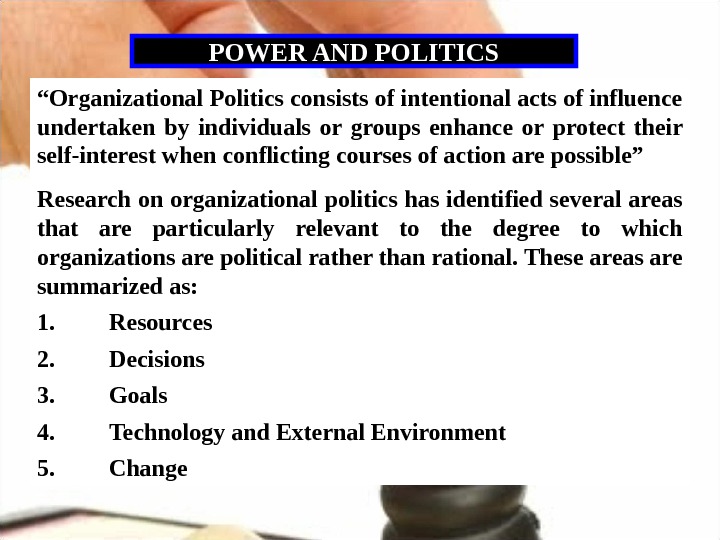
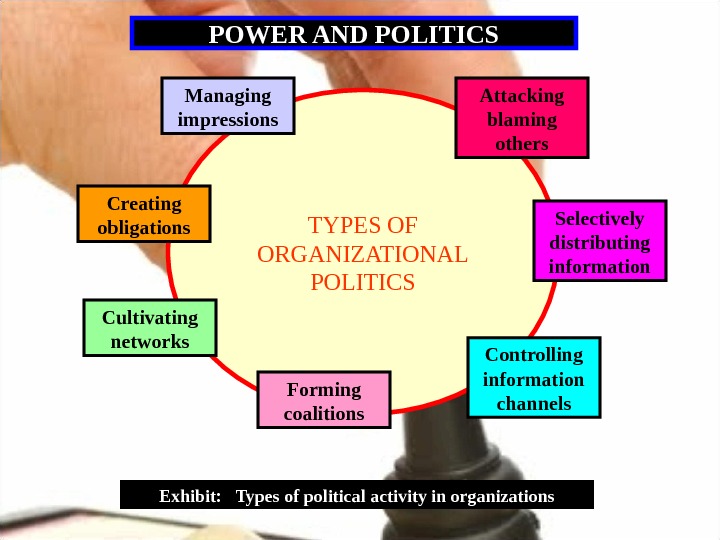
- Размер: 596 Кб
- Количество слайдов: 24
Описание презентации Презентация power and politics по слайдам
 What is power? Power is the ability to … ▫ Get someone to do something you want done. ▫ Make things happen in the way you want “ Power is the opportunity to build, to create, to nudge history in a different direction. » Richard Nixon
What is power? Power is the ability to … ▫ Get someone to do something you want done. ▫ Make things happen in the way you want “ Power is the opportunity to build, to create, to nudge history in a different direction. » Richard Nixon
 POWER AND POLITICS Definition : Power as the probability that one actor within a social relationship will be in a position to carry out his own will despite resistance. Max Weber Power as a potential ability to influence behaviour, to change the course of events, to overcome resistance, and to get people to do things that they would not otherwise do. Pfeffer
POWER AND POLITICS Definition : Power as the probability that one actor within a social relationship will be in a position to carry out his own will despite resistance. Max Weber Power as a potential ability to influence behaviour, to change the course of events, to overcome resistance, and to get people to do things that they would not otherwise do. Pfeffer
 POWER AND POLITICS Meaning of Power: Power is the capacity of a person, team or organization to influence others. Power is not the act of changing others’ attitudes or behaviour its only the potential to do so. The most basic prerequisites of power is that one party believes he or she is dependent on the other for something of value. Person A Person B’s Goal. Power. Counter Power FIG: Dependence in the Power Relationship
POWER AND POLITICS Meaning of Power: Power is the capacity of a person, team or organization to influence others. Power is not the act of changing others’ attitudes or behaviour its only the potential to do so. The most basic prerequisites of power is that one party believes he or she is dependent on the other for something of value. Person A Person B’s Goal. Power. Counter Power FIG: Dependence in the Power Relationship
 POWER AND POLITICS Power dependence Power is often characterized as ‘zero-sum’. That is, power is something that A has over B, such that if A gains in power B correspondingly loses. However, the notion of power dependence suggests that power is also a relational concept, such that the power of A is dependent on B. The exercise of power is an exchange of resources and so A needs B—is dependent on B—in order to exercise power. An example is evident in Britain, where the power of the Prime Minister is dependent on the Cabinet recognizing his or her authority, and implementing his or her decisions. Person A Person B’s Goal. Power. Counter Power FIG: Dependence in the Power Relationship
POWER AND POLITICS Power dependence Power is often characterized as ‘zero-sum’. That is, power is something that A has over B, such that if A gains in power B correspondingly loses. However, the notion of power dependence suggests that power is also a relational concept, such that the power of A is dependent on B. The exercise of power is an exchange of resources and so A needs B—is dependent on B—in order to exercise power. An example is evident in Britain, where the power of the Prime Minister is dependent on the Cabinet recognizing his or her authority, and implementing his or her decisions. Person A Person B’s Goal. Power. Counter Power FIG: Dependence in the Power Relationship
 Power and Dependence Person AA Person B’s Goals. Person BBPerson B’s counterpower over Person A’s power over Person
Power and Dependence Person AA Person B’s Goals. Person BBPerson B’s counterpower over Person A’s power over Person
 Power and Dependence The premises of dependency theory are that: 1. Poor nations provide natural resources, cheap labor, a destination for obsolete technology, and markets for developed nations, without which the latter could not have the standard of living they enjoy. 2. Wealthy nations actively perpetuate a state of dependence by various means. This influence may be multifaceted, involving economics, media, control, politics, banking andfinance, education, culture, sport, andall aspectsofhumanresourcedevelopment (including recruitment and training of workers). 3. Wealthy nations actively counter attempts by dependent nations to resist their influences by means of economicsanctions and/or the use of military force.
Power and Dependence The premises of dependency theory are that: 1. Poor nations provide natural resources, cheap labor, a destination for obsolete technology, and markets for developed nations, without which the latter could not have the standard of living they enjoy. 2. Wealthy nations actively perpetuate a state of dependence by various means. This influence may be multifaceted, involving economics, media, control, politics, banking andfinance, education, culture, sport, andall aspectsofhumanresourcedevelopment (including recruitment and training of workers). 3. Wealthy nations actively counter attempts by dependent nations to resist their influences by means of economicsanctions and/or the use of military force.
 POWER AND POLITICS Distinction Between Power, Authority & Influence: Power is the ability to get an individual or group to do something – to get the person or group to change in some way. The person who possesses power has ability to manipulate or change others. Authority is the right to manipulate or change others. Power need not to be legitimate. Influence : It involves ability to alter other people in general ways, such as by changing their satisfaction and performance. Influence is more closely associated with leadership than power is, but both obviously are involved in the leadership process. Thus authority is different from power because of its legitimacy and acceptance, and influence is broader than power, but it is so conceptually close that the two terms can be used interchangeably.
POWER AND POLITICS Distinction Between Power, Authority & Influence: Power is the ability to get an individual or group to do something – to get the person or group to change in some way. The person who possesses power has ability to manipulate or change others. Authority is the right to manipulate or change others. Power need not to be legitimate. Influence : It involves ability to alter other people in general ways, such as by changing their satisfaction and performance. Influence is more closely associated with leadership than power is, but both obviously are involved in the leadership process. Thus authority is different from power because of its legitimacy and acceptance, and influence is broader than power, but it is so conceptually close that the two terms can be used interchangeably.
 Bases of power in organization. 1. Formal (positional). 2. Informal (personal).
Bases of power in organization. 1. Formal (positional). 2. Informal (personal).
 1. Formal (positional). Power is frequently classified according to whether it stems from the organization or the individual 9 Power, Politics and Leadership
1. Formal (positional). Power is frequently classified according to whether it stems from the organization or the individual 9 Power, Politics and Leadership
 1. Formal (positional). Reward power. Coercive power. Legitimate power. Process power. Information power. Representative power.
1. Formal (positional). Reward power. Coercive power. Legitimate power. Process power. Information power. Representative power.
 Four bases of power : 1. Legitimate Power — the lawful right to make a decision and expect compliance. 2. Reward Power – the authority to give employees rewards for compliance 3. Coercive Power is the power to punish non compliance ; it is based on fear. 4. Information power is power stemming from formal control over the information people need to do their work.
Four bases of power : 1. Legitimate Power — the lawful right to make a decision and expect compliance. 2. Reward Power – the authority to give employees rewards for compliance 3. Coercive Power is the power to punish non compliance ; it is based on fear. 4. Information power is power stemming from formal control over the information people need to do their work.
 2. Informal (personal). This power is derived from the person rather than the organization 12 Power, Politics and Leadership
2. Informal (personal). This power is derived from the person rather than the organization 12 Power, Politics and Leadership
 2. Informal (personal). Expert power. Rational persuasion. Referent power.
2. Informal (personal). Expert power. Rational persuasion. Referent power.
 Types of Personal Power 1. Expert power is the ability to influence others through specialized knowledge , skills or abilities. 2. Referent power is the ability to influence others through one’s desirable traits and characteristics 3. Prestige power stems from one’s status and reputation 14 Power, Politics and Leadership
Types of Personal Power 1. Expert power is the ability to influence others through specialized knowledge , skills or abilities. 2. Referent power is the ability to influence others through one’s desirable traits and characteristics 3. Prestige power stems from one’s status and reputation 14 Power, Politics and Leadership
 Commitment. Consequences of Power Reward Power. Legitimate Power Coercive Power. Expert Power Referent Power Resistance. Compliance. Sources of Power Consequences of Power
Commitment. Consequences of Power Reward Power. Legitimate Power Coercive Power. Expert Power Referent Power Resistance. Compliance. Sources of Power Consequences of Power
 POWER AND POLITICS Sources of Power: Social psychologist John French and Bertram Raven identified five categories of sources of power. 1. Expert 2. Referent 3. Legitimate 4. Reward 5. Coercive The first three power bases are derived from the power holder’s position i. e. the person receive these power bases because of the specific authority or roles he or she is assigned. Last two originates from the power holder’s own characteristic. In other words, people bring these power bases to the organization.
POWER AND POLITICS Sources of Power: Social psychologist John French and Bertram Raven identified five categories of sources of power. 1. Expert 2. Referent 3. Legitimate 4. Reward 5. Coercive The first three power bases are derived from the power holder’s position i. e. the person receive these power bases because of the specific authority or roles he or she is assigned. Last two originates from the power holder’s own characteristic. In other words, people bring these power bases to the organization.
 POWER AND POLITICS Contingency Approaches To Power: Pfeffer Simply says that power comes from being in the “right” place. He describes the right place or position in the organization as one where the manager has: 1. Control over resources such as budgets, physical facilities, and positions that can be used to cultivate, allies and supporters. 2. Control over or extensive access to information about the organizations activities, about the preferences and judgement of others, about what is going on, and who is doing it. 3. Formal authority.
POWER AND POLITICS Contingency Approaches To Power: Pfeffer Simply says that power comes from being in the “right” place. He describes the right place or position in the organization as one where the manager has: 1. Control over resources such as budgets, physical facilities, and positions that can be used to cultivate, allies and supporters. 2. Control over or extensive access to information about the organizations activities, about the preferences and judgement of others, about what is going on, and who is doing it. 3. Formal authority.
 POWER AND POLITICS Contingency Conclusions (Research Supported) : 1. The greater the professional orientation of group members, the greater relative strength referent power has in influencing them. 2. The less effort and interest high ranking participants are willing to allocate to a task, the more likely lower-ranking participants are to obtain power relevant to this task
POWER AND POLITICS Contingency Conclusions (Research Supported) : 1. The greater the professional orientation of group members, the greater relative strength referent power has in influencing them. 2. The less effort and interest high ranking participants are willing to allocate to a task, the more likely lower-ranking participants are to obtain power relevant to this task
 POWER AND POLITICS Reward Coercive Means & Control Target influence ability Required Condition Wants to gain a favourable reaction, wants to avoid a punishing one from the agent. The agent must have surveillance over the target. Find a self-satisfying relationship with the agent wants to establish and maintain a relationship with the agent. The agent must have salience, the agent must be in the forefront of the target awareness. Goes along with the agent because of consistency with internal values. The agent must have relevance. Compliance Process of Power. Required Sources of Power Referent Attractiveness Expert Legitimate Credibility Identification Internalization FIG: An Overall Contingency Model of Power based on the French / Raven and Kelman Theories.
POWER AND POLITICS Reward Coercive Means & Control Target influence ability Required Condition Wants to gain a favourable reaction, wants to avoid a punishing one from the agent. The agent must have surveillance over the target. Find a self-satisfying relationship with the agent wants to establish and maintain a relationship with the agent. The agent must have salience, the agent must be in the forefront of the target awareness. Goes along with the agent because of consistency with internal values. The agent must have relevance. Compliance Process of Power. Required Sources of Power Referent Attractiveness Expert Legitimate Credibility Identification Internalization FIG: An Overall Contingency Model of Power based on the French / Raven and Kelman Theories.
 POWER AND POLITICS Political Implication of Power: “Organizations, particularly large ones, are like governments in that they are fundamentally political entities. To understand them, one needs to understand organizational politics, just as to understand governments. One needs to understand governmental polices”. Pfeffer The political perspective of organization departs from the rational, idealistic model. For e. g. Waiter Nord dispels four postulates of power in organization that help focus on political realities:
POWER AND POLITICS Political Implication of Power: “Organizations, particularly large ones, are like governments in that they are fundamentally political entities. To understand them, one needs to understand organizational politics, just as to understand governments. One needs to understand governmental polices”. Pfeffer The political perspective of organization departs from the rational, idealistic model. For e. g. Waiter Nord dispels four postulates of power in organization that help focus on political realities:
 POWER AND POLITICS 1. Organizations are composed of coalitions which compete with one another for resources, energy and influence. 2. Various coalitions will seek to protect their interests and positions of influence. 3. The unequal distribution of power itself has dehumanizing effects. 4. The exercise of power within organizations is one very crucial aspect of the exercise of power within the larger social system.
POWER AND POLITICS 1. Organizations are composed of coalitions which compete with one another for resources, energy and influence. 2. Various coalitions will seek to protect their interests and positions of influence. 3. The unequal distribution of power itself has dehumanizing effects. 4. The exercise of power within organizations is one very crucial aspect of the exercise of power within the larger social system.
 Political Power for Organiztions
Political Power for Organiztions
 POWER AND POLITICS “ Organizational Politics consists of intentional acts of influence undertaken by individuals or groups enhance or protect their self-interest when conflicting courses of action are possible” Research on organizational politics has identified several areas that are particularly relevant to the degree to which organizations are political rather than rational. These areas are summarized as: 1. Resources 2. Decisions 3. Goals 4. Technology and External Environment 5. Change
POWER AND POLITICS “ Organizational Politics consists of intentional acts of influence undertaken by individuals or groups enhance or protect their self-interest when conflicting courses of action are possible” Research on organizational politics has identified several areas that are particularly relevant to the degree to which organizations are political rather than rational. These areas are summarized as: 1. Resources 2. Decisions 3. Goals 4. Technology and External Environment 5. Change
 POWER AND POLITICS TYPES OF ORGANIZATIONAL POLITICS Selectively distributing information Controlling information channels. Forming coalitions. Cultivating networks. Creating obligations Managing impressions Attacking blaming others Exhibit: Types of political activity in organizations
POWER AND POLITICS TYPES OF ORGANIZATIONAL POLITICS Selectively distributing information Controlling information channels. Forming coalitions. Cultivating networks. Creating obligations Managing impressions Attacking blaming others Exhibit: Types of political activity in organizations
